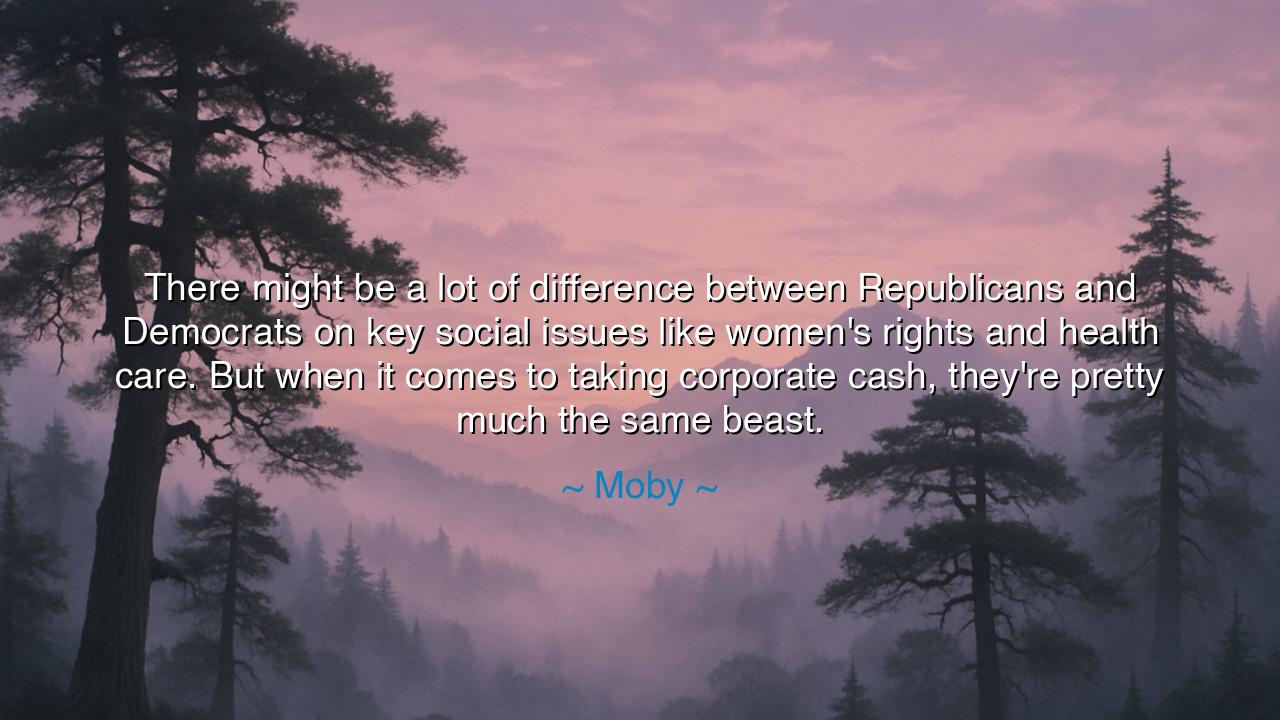
There might be a lot of difference between Republicans and
There might be a lot of difference between Republicans and Democrats on key social issues like women's rights and health care. But when it comes to taking corporate cash, they're pretty much the same beast.






The Illusion of Division
Listen well, O seeker of truth, to the words of Moby, the musician and philosopher of modern conscience, who looked upon the stage of politics and saw beyond its costumes. He said: “There might be a lot of difference between Republicans and Democrats on key social issues like women's rights and health care. But when it comes to taking corporate cash, they're pretty much the same beast.” These words are not of cynicism, but of awakening. They reveal the ancient pattern that repeats in every age: the powerful may quarrel in speech, but unite in interest. The beast he speaks of is not a party, but greed—a many-headed creature that feeds upon the trust of the people.
The Meaning of the Teaching
To understand this truth, one must see that power without virtue bends to the same hunger, no matter its name or banner. Whether the cloak is red or blue, conservative or liberal, when the hand is open to corporate gold, the spirit of service dies. Moby’s words strike at the heart of a civilization that mistakes debate for difference, and performance for principle. He reminds us that the corruption of politics is not born from ideology but from dependency upon wealth—that those who take the coin of the powerful will one day serve the giver, not the governed. Thus, he calls us to discernment, to see beneath the surface of slogans and speeches.
The Origin of the Words
Moby, known first for his music, became also a voice for conscience, one unafraid to challenge both the rulers and the ruled. Having lived among the elite, he saw how corporate influence quietly steered the course of governance, how campaign coffers filled with the same coins no matter the party’s promise. His words arose not from bitterness, but from witness—a witness to how democracy, when purchased, ceases to be the will of the people and becomes the will of those who profit. In his lament, there is warning, but also hope: for once the people see clearly, the chains of deception begin to crack.
The Mirror of History
History itself has long reflected this truth. In the waning days of the Roman Republic, the Senate was divided by factions that claimed to fight for the people or for tradition. Yet both took gold from merchants and generals, their votes bought as easily as grain in the market. The result was decay from within—liberty traded for luxury, principle sold for comfort. Rome’s fall did not come only by sword, but by the corruption of its leaders, who spoke for virtue while serving wealth. The same pattern weaves through the centuries: kingdoms, republics, and democracies alike fall when money outweighs morality.
The Beast of Influence
The beast that Moby names has many forms—corporations that whisper into the ears of lawmakers, lobbyists who write laws in the shadows, industries that sell illusion to the masses. It does not roar or rage; it smiles and sponsors, it donates and decorates. It is not evil in the sense of fire and blood, but in the quiet erosion of conscience. It convinces the servant of the people that compromise is wisdom and that profit is progress. Yet the wise see through its charm. They know that when the same hand feeds all factions, no true opposition remains—only the illusion of choice.
The Courage to See
But despair not, for Moby’s words are not a curse but a call to awareness. The first step toward freedom is sight—to see the web that binds politics to power. The people must become as watchful as sentinels, demanding transparency and integrity, not empty rhetoric. They must support leaders who refuse the poisoned coin, who remember that governance is sacred service, not commerce. It is not enough to choose between colors or slogans; one must choose character. True change begins not with a vote alone, but with vigilance and virtue in the hearts of the people.
The Lesson for the Generations
So, O listener, learn this wisdom: Beware the beast that wears many faces but speaks one tongue—greed. Whether in politics, in business, or in one’s own life, do not serve two masters: conscience and coin cannot dwell in the same heart. Support leaders who act from conviction, not convenience. Demand laws that protect life and dignity over profit. And remember that the strength of a nation lies not in its wealth, but in the honor of those who guide it.
The Eternal Call
Thus, let Moby’s words resound through the ages: Do not be deceived by division; look deeper, question louder, live truer. The world will always have parties and sides, but integrity has only one banner—the truth. Let your loyalty be not to factions, but to justice. Let your allegiance be not to money, but to mankind. For when the people themselves rise above corruption, the beast of greed will starve, and a new dawn of honest leadership will light the earth once more.






AAdministratorAdministrator
Welcome, honored guests. Please leave a comment, we will respond soon